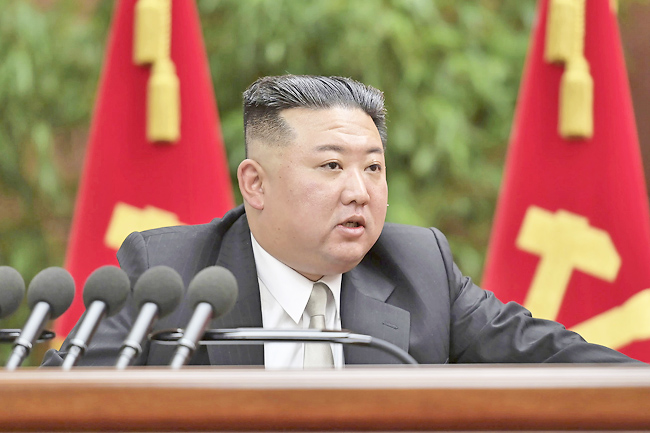SEOUL, SOUTH KOREA (AP) – North Korean leader Kim Jong-un presented unspecified goals to further bolster his military power next year at a meeting of top political officials, state media reported yesterday, in an indication he’ll continue his provocative run of weapons displays.
Kim’s statement came as animosities with rival South Korea rose sharply this week as the South accused the North of flying drones across the rivals’ border for the first time in five years. This year, North Korea already performed a record number of missile tests in what experts call an attempt to modernise its arsenal and increase its leverage in future dealings with the United States (US).
During the Tuesday session at the ongoing plenary meeting of the ruling Workers’ Party, Kim analysed new security challenges in international politics and on the Korean Peninsula and clarified principles and directions to take in external relations and fights against enemies to protect national interests and sovereignty, according to the official Korean Central News Agency (KCNA).
Kim “set forth new key goals for bolstering up the self-reliant defence capability to be pushed ahead with in 2023 under the multilaterally changing situation”, KCNA said, without elaborating.
Some observers said the new goals could be related to Kim’s push to expand his nuclear arsenal and introduce a spate of high-tech weapons systems such as multi-warhead missiles, a more agile long-range weapon, a spy satellite and advanced drones. They say Kim would eventually aim to use his boosted nuclear capability to force its rivals to accept the North as a legitimate nuclear state, a status he would think is essential in getting international sanctions on his country to be lifted.

On Monday, South Korea’s military fired warning shots and launched fighter jets and helicopters, after detecting what it called five North Korean drones that violated the South’s airspace. South Korea also flown its own surveillance assets, in a likely reference to unmanned drones, across the border into North Korea in response.
South Korea’s military said it had failed to shoot down the drones and offered a public apology over causing security concerns.
President Yoon Suk-yeol called for strong air defence and high-tech stealth drones to better monitor North Korea.
Some experts said the North Korean drone flights might have been designed to test South Korean and US readiness and neutralise a previous inter-Korean tension-reduction agreement. They said North Korea likely assessed its drones as a cheap yet effective method to cause security jitters and a domestic divide in South Korea.
Yoon, a conservative who took office in May, said on Tuesday that South Korea has had little anti-drone training since 2017, a year when his liberal predecessor Moon Jae-in was inaugurated. In an apparent effort to blame the allegedly lax air defence system to Moon’s engagement policy toward North Korea, Yoon said that “I think our people must have seen well how dangerous a policy relying on the North’s good faith and (peace) agreements would be”.
Moon’s liberal opposition Democratic Party accused the president of trying to shift a responsibility for his government’s security policy failure to someone else.





